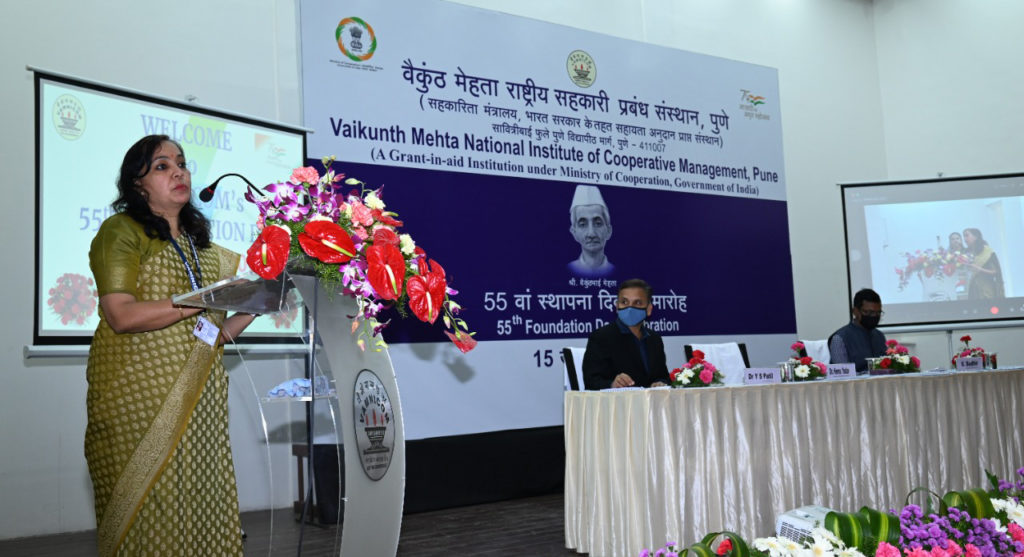Top Cooperative Ministry officials vied to participate in the Foundation Day celebrations of the Vaikunth Mehta National Institute of Cooperative Management, Pune, which was observed at the Shivneri Auditorium of the institute on Saturday in Pune.
D. K. Singh, Secretary, Ministry of Cooperation, Government of India, was the Chief Guest, and Dr. Shalini Randheria, Rector and President of Central European University, Vienna, Austria was the Guest of Honour. Vijay Kumar, Additional Secretary, GOI, and the Chairman, Management Committee, VAMNICOM were also present. These guests joined the function in the virtual mode.
A national-level Co-operative Management Institute under the Ministry of Cooperation, Vamnicom serves as an intellectual nerve center for agriculture, cooperative and rural development. “It tries to make members of cooperatives so professional that they can be competitive in the fast-changing environment”, reads a press note from the Institute.
The function began with the Lighting of Lamp and welcoming the guests, Dr Hema Yadav, Director said the 55th Foundation Day is being celebrated along with the 75th year of Azadi ka Amrit Mahotsav. She narrated how VAMNICOM played a significant role in the cooperative movement by imparting training, building capacity, and educating management of the sector by building cadres of professional managers to take key positions in cooperatives through management development.
She briefed that the journey from 54th to 55th Foundation Day has been a year of commitment to cooperative training and supporting the policies of the Ministry. Advantaged with a rich intellectual legacy, VAMNICOM has been able to position itself as a professional and academic institute with the purpose to foster shared learning in the enablement of cooperatives, Hema underlined.
It has produced a number of successful and skilled agri-managers in the country since 2004 and has led to spurring of activities in the area of research, consultancy assignments and related academic aspects viz., working paper series, the international publication of books, cooperative case studies, and various MOUs”, said Patil.
Vijay Kumar, Additional Secretary who doubles as the Chairman, Management Committee, VAMNICOM emphasized the strengthening of the co-op movement in the country. He highlighted a number of initiatives being undertaken by the govt which included computerization of PACS, formulation of national co-op policy, and others.
Kumar said the work of Cooperatives has touched all walks of life and covered 90% of villages in the country. Cooperatives are instrumental in providing agriculture credit at low cost to the farmers at the grassroots level. The success stories of some of the cooperatives are known all over the world. The cooperatives sector has the potential to transform the lives of crores of farmers, artisans, fishermen, laborers and the public at large, felt Kumar.
Dr. Shalini Randheria, Rector and President of Central European University, Vienna, Austria, dwelt on the life and work of Shri Vaikunthbhai Mehta- the doyen of the country’s cooperative movement. “Vaikunth Mehta would be remembered as the Architect of Indian Cooperative Movement, not because he devoted himself to the cooperative movement as his life mission but also because he initiated and consistently pursued certain innovations in cooperative ideology and practices in international cooperatives movements to suit the Indian conditions and environment”, she said.
D. K. Singh, Secretary, Ministry of Cooperation, Government of India, in his speech, appreciated the book “Doyen of Cooperation” which gave insights into the life of Shri. Vaikunthbhai Mehta. He mentioned that the government has created the Ministry of Cooperation which will give a new direction to the cooperative movement in the country. The role of ethics in cooperatives is very important and relevant in today’s scenario, where the institute should give importance to the ethics, integrity, and democratic principles in governance.
V. Sudhir, Registrar of the Institute gave a vote of thanks.
